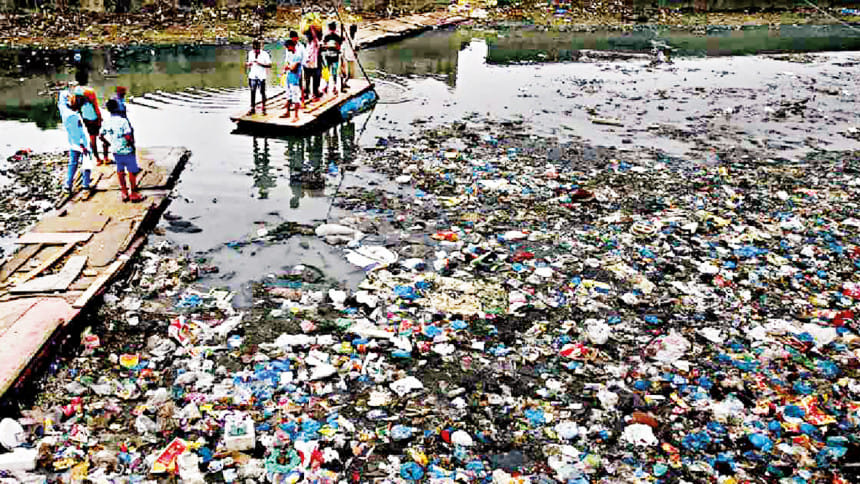Laws and policies on plastic waste management

Plastic waste disposal is a serious issue for Bangladesh with only a small portion of the nation's annual plastic waste production – which is estimated to be 2 point 4 million tons – getting recycled. The remainder finds its way into landfills, bodies of water, and other locations where the waste contaminate the environment and endanger human health.
The management of plastic waste may be addressed under several laws. The primary environmental legislation in this regard is the Bangladesh Environment Conservation Act, 1995 (BECA). In 2002, the BECA was amended to use Section 6A which empowers the government, through the Ministry of Environment, Forest and Climate Change to impose bans on the manufacturing, production, display, marketing and sale of all or any kind of polythene shopping bags, among others, in any specific part of the country or generally all over the country. Contravention of an order passed under Section 6A is an offence punishable by fine and/or imprisonment.
There are several other laws and regulations that may aid the reduction of plastic waste, such as the Solid Waste Management Rules, 2021 and the Jute Packaging Act, 2010. The Solid Waste Management Rules, 2021 sets out the procedures for collecting, transporting, and disposing of solid waste, including plastic waste and requires the manufacturers to report the amount of plastic that has been recycled. The Jute Packaging Act, 2010 promotes the use of jute bags as an alternative to plastic bags. Every product must be packaged in jute bags, as required by the Act. For using non-biodegradable synthetics for packaging, offenders risk a maximum of one year in prison and/or a fine of BDT 50,000.
The laws do reflect the government's willingness to make waste management system more sustainable– indeed, it has also undertaken several projects to make Dhaka a clean city. With the help of the Bangladesh Climate Change Trust Fund, the Department of Environment (DoE) launched a pilot project in 2012 to test the 3R strategy—reduce, reuse, and recycle—for better waste management. Residential buildings in various parts of Dhaka were given four different types of waste bins under the project to store organic, inorganic, hazardous, and mixed wastes separately. The bins were coloured green, yellow, red, and blue. The 3R method called for recycling inorganic wastes like plastic and glass while using organic household waste to produce biogas and organic fertiliser.
To counteract the rising tide of plastic waste, these measures, however, have fallen short. These efforts, as a result, are unable to produce the desired outcomes. Effective management of plastic waste faces many difficulties in Bangladesh. Lack of knowledge on the issue of plastic pollution is one barrier. In Bangladesh, many people still use and dispose of plastic products in an unsustainable manner because they are unaware of the negative consequences of plastic waste.
Lack of infrastructure for managing plastic waste is another problem. The systems in place for gathering and disposing of waste are insufficient, and there aren't enough recycling facilities to handle the enormous amount of plastic waste that is produced. Last but not the least, there is lack of political will across all administrative tiers to address the plastic pollution issue.
The management of plastic waste is a complex issue. It must be addressed well by the government to protect the environment and the people.
The Writer is Law Desk Intern, The Daily Star.

 For all latest news, follow The Daily Star's Google News channel.
For all latest news, follow The Daily Star's Google News channel. 



Comments